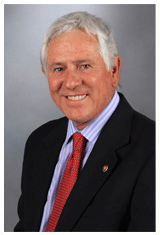JEFFERSON CITY — Next week marks the annual veto session when lawmakers in the Senate and House gather to consider the governor’s vetoes of bills passed by the Legislature during the regular session. Most veto sessions don’t last very long and are fairly uneventful. That will likely not be the case this year as the governor set a personal record by vetoing 33 bills and also line-item vetoed about 120 items in the budget for Fiscal Year 2015, which began July 1.
This sets the stage for what could be a very contentious and long veto session. Our system of government features an important set of checks and balances which allows each of the three branches of government (Legislative, Executive, and Judicial) to check the authority of the other two - ensuring that too much power does not rest in any one branch. The governor’s check on the Legislature is his ability to veto bills he doesn’t agree with or veto budget items he opposes or thinks unwise. In turn, the Legislature can check the authority of a governor who may be vetoing bills for overtly political reasons or that conflict with the will of voters who voted in majorities in the Senate and House.
To override a veto, a two-thirds vote is necessary in both chambers. Currently, the Majority Caucus control 110 of the 163 House seats and 23 of the 34 Senate seats, making them veto-proof in both. However, this is a bare supermajority in the Senate and only one vote above a supermajority in the House. It will require nearly every majority vote or the votes of a few minority members to override many vetoes. I am confident some will be overridden while others may not. As I make the difficult decision to vote on these vetoes, I would appreciate your input. Your involvement is a vital part of the legislative process. Please feel free to comment any vetoes which can be viewed at: www.gov.mo.gov/actions.
One particular veto I will be working hard to override is the governor’s cut of $5.2 million for the Missouri Rehabilitation Center (MRC) in Mt. Vernon which has prompted the University of Missouri to announce their closing of the facility on Oct. 31. MRC employs over 300 people from all over Southwest Missouri and provides care in an underserved area and for many patients who are otherwise unable to afford it. MRC is important to health care delivery in our state and is an integral part of our community. The timing and manner of the announcement is unacceptable. Lawmakers were not made aware of the closure in advance and no one from the governor’s office voiced any concerns or problems with funding or operation of MRC. Furthermore, no meetings were held to discuss future or alternative options for MRC.
This is the wrong way to treat the employees and local community who have supported MRC over the years, and I am committed to doing whatever I can to keep MRC open. At a recent meeting, I asked University of Missouri officials to delay the closing and allow administrators the time to bring in new services, work with the VA on expanded services and a long-term commitment, and to eventually operate independently of state funding. Next week, I will be working with my colleagues to override the governor’s veto of MRC’s funding and will continue to put pressure on the governor and the University to keep the facility open or explore other options for MRC. I am meeting with University officials again next week and will be pressing hard for a delay of MRC’s closing and for a renewed discussion of its long-term future.
As always, I welcome your ideas, questions and concerns about Missouri government. You may contact me at the State Capitol as follows: (573) 751-1480, david.sater@senate.mo.gov or by writing to Sen. David Sater, Missouri State Capitol, Room 433, Jefferson City, MO 65101. |



